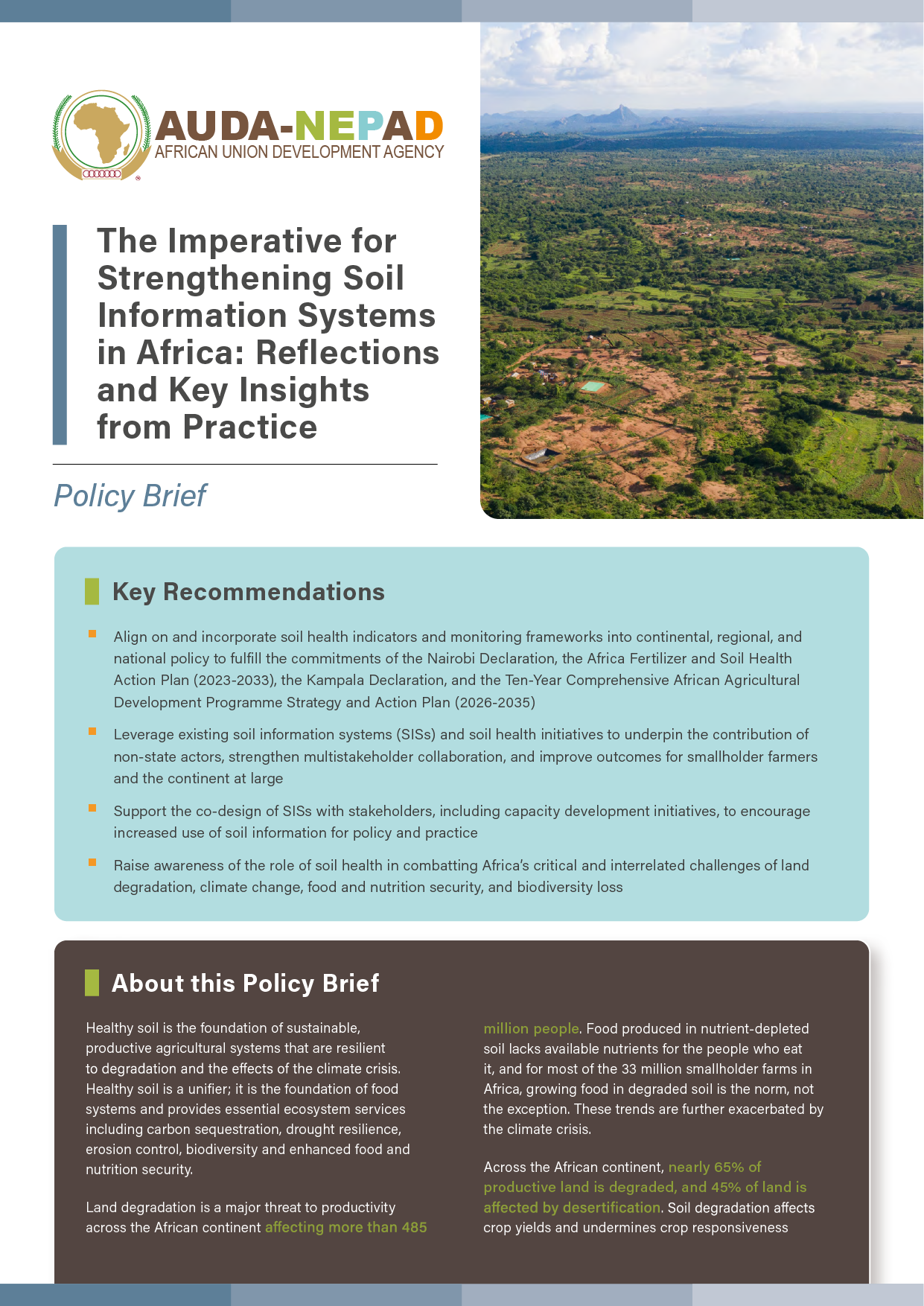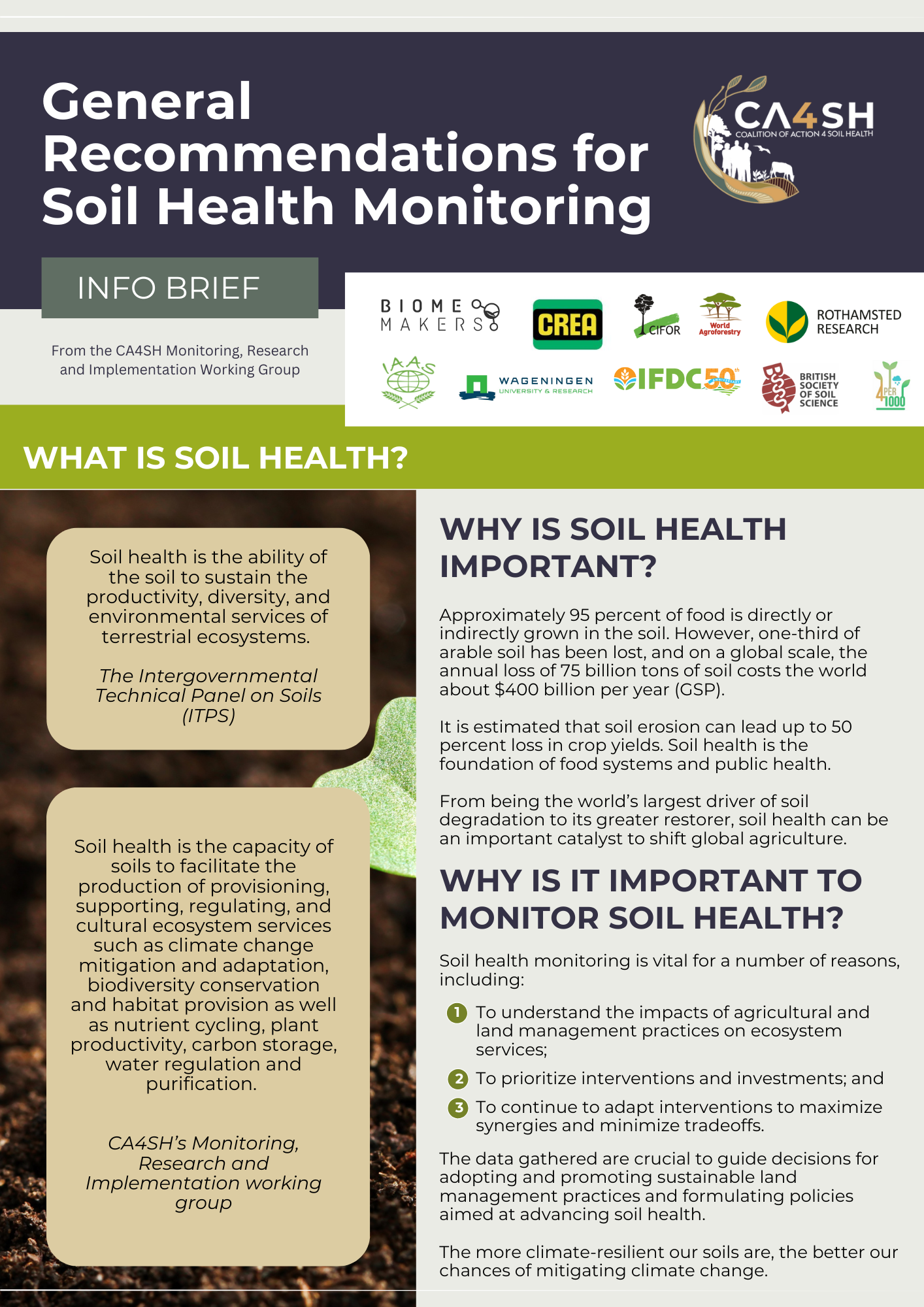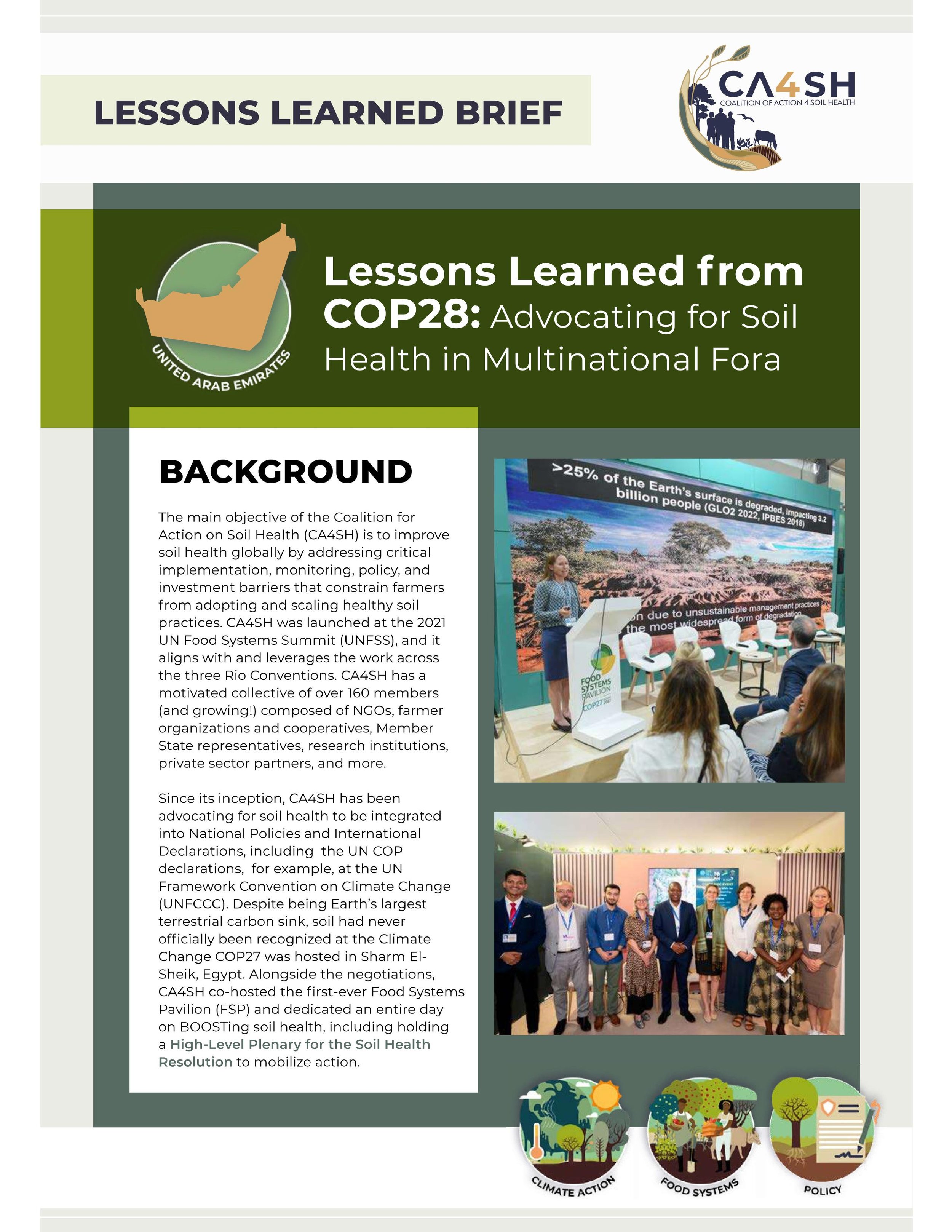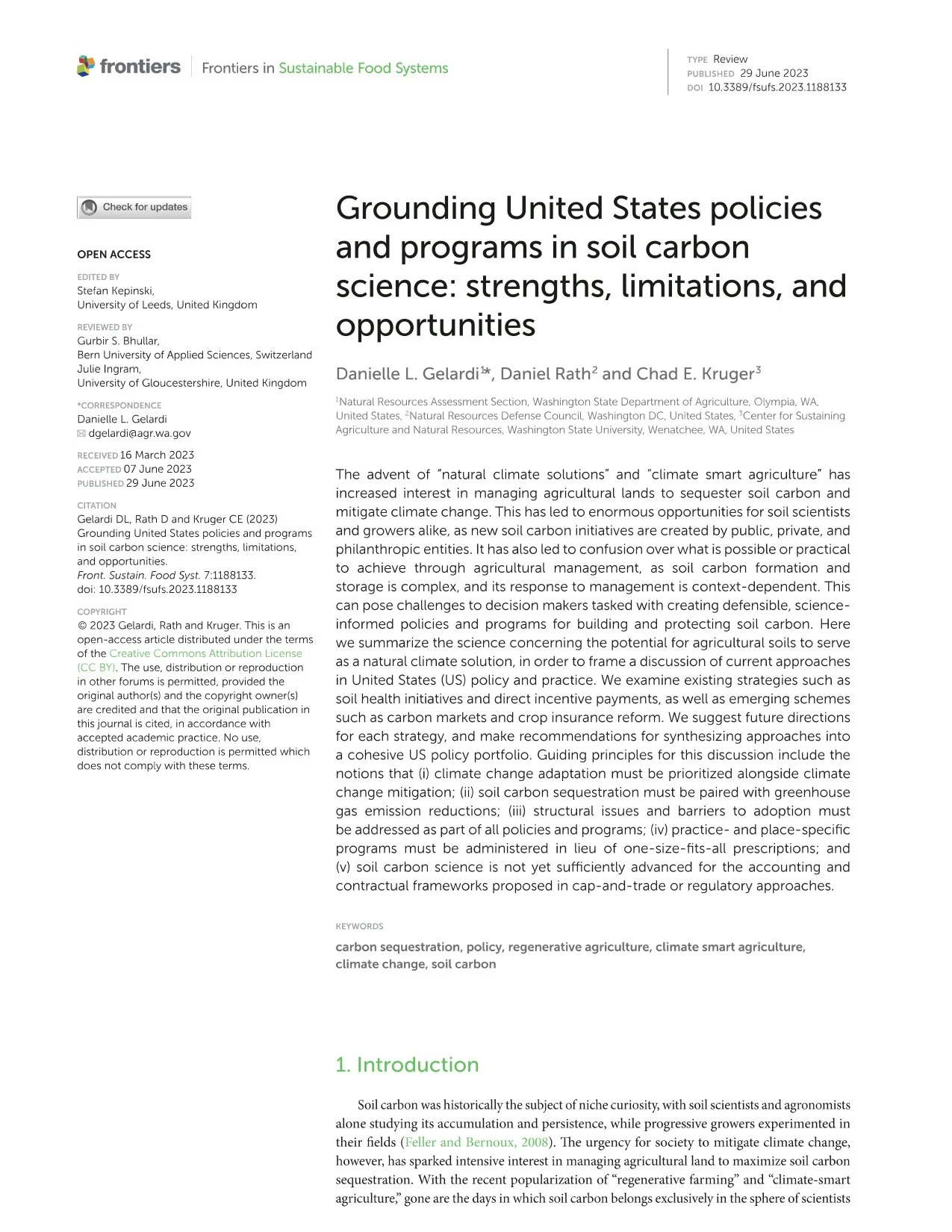Resource Library
Feature Resource:

Insight Brief: The Imperative for Strengthening Soil Information Systems in Africa: Reflections and Key Insights from Practice
African Heads of State and Government formally adopted the Africa Fertilizer and Soil Health (AFSH) Summit Declaration, also known as the Nairobi Declaration, during the AFSH Summit. The AFSH Summit addressed the urgent need to improve soil health and enhance fertilizer utilization across the continent to boost agricultural productivity and alleviate hunger and poverty. These priorities were initially identified in the 2006 Abuja Declaration on Fertilizer for the African Green Revolution.
Furthermore, the 2014 Malabo Declaration under the Comprehensive Africa Agriculture Development Program (CAADP) reaffirmed AU Member States' commitment to inclusive agricultural transformation, building on earlier initiatives such as the 2003 Maputo Declaration on CAADP and the 2004 Sirte Declaration on sustainable agriculture and water management. Despite these commitments, AU Member States have faced significant challenges in implementing the objectives outlined in these declarations.

The Imperative for Strengthening Soil Information Systems in Africa: Reflections and Key Insights from Practice
Only through collaborative, cohesive soil health monitoring efforts can AU Member States ensure that interventions are based on evidence to maximize impact. For example, such a monitoring framework can be used to prioritize, track and adapt locally revelant interventions. In turn these data can be used to inform policy and financial investments. This policy brief outlines the case for African policymakers to scale soil information systems (SISs) and integrate them into continental, regional and national policy frameworks.

Guidance Note - Advancing Africa's Soil Health Monitoring to Support the Nairobi Declaration and CAADP Kampala Agenda
To reverse Africa's interrelated challenges of land degradation, climate change, food security and biodiversity loss, African Union (AU) Member States will need to markedly increase the health of their soils and invest in soil restoration that is targeted and based on scientific evidence.

Youth Initiatives for Scaling Soil Health: Advice from #Youth4Soil Global Advocates
The Coalition of Action 4 Soil Health (CA4SH) is a multistakeholder partnership committed to scaling soil health, globally. CA4SH places a high degree of importance on the role of youth as innovators and experts toward scaling global soil health. Youth are engaged through the #Youth4Soil movement, which includes a working group, mentorship opportunities, and support for speaking and engagement. We also want to highlight youth approaches to advocating for global soil health.
In April 2024, Roël D. Houdanon, Founder & Chief Technical Advisor, Land and Health Association shared an op-ed highlighting the role of youth in defending soil health. He presented several avenues for youth to get involved in scaling soil health:
Awareness Raising
Innovation & Technology
Policy Advocacy
Community Engagement
Education
Science & Research
We reached out to youth partners to learn about their individual approaches to scaling soil health through these thematic action areas.
These are their responses.

General Recommendations for Soil Health Monitoring
The CA4SH Monitoring, Research and Implementation have compiled expert advice and considerations for those looking to monitor soil health.

The Road Ahead for Soil Health Action: A Call to Action from the 2024 CA4SH Webinar Series
The Coalition of Action 4 Soil Health (CA4SH) is a multi stakeholder partnership committed to scaling soil health, globally. CA4SH ’s membership base comprises stakeholders from member states, the private sector, research institutions, civil society, farmer organisations, multilateral organisations, and NGOs.
To leverage the wealth of knowledge and experiences from across our partners in addressing key challenges currently constraining farmers to implement healthy soil practices, CA4SH held a three-part virtual Webinar Series in early 2024. The 2024 Webinar Series was held over three sessions under the topics of bringing soil health into policy, science & knowledge for improving and monitoring soil health, and financing healthy soil practices. The objectives were to explore soil-related themes and share experiences with a focus on tailoring and scaling successful methodologies.
This brief summarizes the sessions, and coallates lessons learned, calls to action, and opportunities for scaling these approaches to align action on soil ahead of the 2024 Rio Conventions.

Lessons Learned from COP28: Advocating for Soil Health in Multinational Fora
Soil health was formally recognized in the COP28 UAE Declaration on Sustainable Agriculture, Resilient Food Systems, and Climate Action, in part because of the advocacy approach taken by CA4SH and our partners. In this brief, CA4SH partners and member states who engaged in this process lay out key lessons learned while advocating for soil in the context of the UNFCCC COPs, with recommendations for scaling this approach in other contexts.

2023 CA4SH Annual Report
For the Coalition of Action 4 Soil Health (CA4SH), 2023 was marked by continual learning and exponential growth, and we are celebrating by launching the inaugural Annual Report. Highlights include a reflection on our roots and growing the Coalition (which now has over 170 multistakeholder members and counting!), zooming in on key engagements, advocating for soil health in the climate agenda, achievements, lessons learned, and a look at what’s to come.

Healthy soils sustain foodsystem transformationsto contribute to the net zeroCO2emission target by 2050
Food system transformation is needed for "safeguarding food security and ending hunger, and the particular vulnerabilities of food production systems to adverse impact of climate change".
Read the full policy brief from 4p1000, CIRAD, and IRD

Payments for Ecosystems Services to Support Transitions to Sustainable Agriculture and Land Use
This brief focuses on Payments for Ecosystems or Environmental Services (PES) as a mechanism for providing incentives to land users to transition to more sustainable land management.
Agriculture and food systems are both drivers and victims of escalating climate and nature crises, in turn increasing the risks to healthy diets, livelihoods and economies. Public policies can set incentives for farming and market practices that further exacerbate these trends, but they can also play a role in reversing them. The global Agriculture Policy Dialogue on Transition to Sustainable Agriculture is a peer-to-peer platform to share experience, facilitate partnerships and catalyse policy leadership to accelerate the transition to sustainable agriculture and food systems that benefit people, prosperity and the planet.
Policy Pathway Briefs provide an overview of emerging experiences and lessons on policy approaches that contribute to this transition, covering a series of topics requested by Policy Dialogue members, to support peer leaning and knowledge exchange. The briefing notes are in no way exhaustive. The options facing governments will be context specific and look different across and within countries. The notes aim to act as a discussion starter and to facilitate exchanges between countries engaged in the Agriculture Policy Dialogue and with other global initiatives, drawing on the experiences presented by members and examples identified through further research.

Promoting Healthy Soils and Land
This brief focuses on soil health, identifying policy instruments and actions for governments to provide incentives and support to farmers to protect and restore agricultural soils.
Agriculture and food systems are both drivers and victims of escalating climate and nature crises, in turn increasing the risks to healthy diets, livelihoods and economies. Public policies can set incentives for farming and market practices that further exacerbate these trends, but they can also play a role in reversing them. The global Agriculture Policy Dialogue on Transition to Sustainable Agriculture is a peer-to-peer platform to share experience, facilitate partnerships and catalyse policy leadership to accelerate the transition to sustainable agriculture and food systems that benefit people, prosperity and the planet.
Policy Pathway Briefs provide an overview of emerging experiences and lessons on policy approaches that contribute to this transition, covering a series of topics requested by Policy Dialogue members, to support peer leaning and knowledge exchange. The briefing notes are in no way exhaustive. The options facing governments will be context specific and look different across and within countries. The notes aim to act as a discussion starter and to facilitate exchanges between countries engaged in the Agriculture Policy Dialogue and with other global initiatives, drawing on the experiences presented by members and examples identified through further research.

Promoting Efficient Use and Greener Production of Fertilizers
This brief focuses on fertilizers and provides guidance on policy actions that can incentivize efficient and more sustainable use and production of synthetic fertilizers.
Agriculture and food systems are both drivers and victims of escalating climate and nature crises, in turn increasing the risks to healthy diets, livelihoods and economies. Public policies can set incentives for farming and market practices that further exacerbate these trends, but they can also play a role in reversing them. The global Agriculture Policy Dialogue on Transition to Sustainable Agriculture is a peer-to-peer platform to share experience, facilitate partnerships and catalyse policy leadership to accelerate the transition to sustainable agriculture and food systems that benefit people, prosperity and the planet.
Policy Pathway Briefs provide an overview of emerging experiences and lessons on policy approaches that contribute to this transition, covering a series of topics requested by Policy Dialogue members, to support peer leaning and knowledge exchange. The briefing notes are in no way exhaustive. The options facing governments will be context specific and look different across and within countries. The notes aim to act as a discussion starter and to facilitate exchanges between countries engaged in the Agriculture Policy Dialogue and with other global initiatives, drawing on the experiences presented by members and examples identified through further research.

Soils and sustainable development goals of the United Nations: An International Union of Soil Sciences perspective
Abstract
Being critical to achieving Sustainable Development Goals (SDGs) of the United Nations, strengthening understanding of the properties and processes of soil at national and regional scales is imperative. The necessity to realize SDGs by 2030 also inspires a greater sense of responsibility and care for soils…

Natural Carbon Sequestation: Leveraging Soils for Mitigation, Storage & Biodiversity Benefits
This presentation was given in a side event from the British Society of Soil Science at the UNFCCC COP28 in Dubai.
Learn more and download the presentation

EU Mission Soil Week Event Material
The European Mission Soil Week is an annual event aimed at promoting the Mission Soil, raising awareness about the importance of soil health, and driving action to protect and restore our soils.
The EU Mission Soil Week website has compiled a library of event materials from the November 2023 event including presentations, recordings, graphics and more.

Food Forward NDCs: Guidance to enhance NDC ambition and implementation for agriculture and food systems transformation
FOOD FORWARD NDCs is a simple, interactive, web-based tool that presents users with tangible, evidence-backed policy options and measures, and available literature for transitioning to nature-positive, healthy, and resilient food systems through NDCs. The available policy options can be tailored to a country’s specific food system priorities and different intervention areas of the food system, such as food environment, food governance, food production, supply chain, and consumption. The guidance does not intend to prescribe solutions, but instead, presents a menu of policy options as a starting point for decision-makers to further develop and implement on-theground measures for food systems transformation based on national and local contexts.
Download the full primer document from WWF

COP28 UAE Declaration on Sustainable Agriculture, Resilient Food Systems, and Climate Action
The COP28 Presidency today announced that 134 world leaders have signed up to its landmark agriculture, food and climate action declaration.
Download resources from the COP28 Presidency

Towards a definition of soil health
The Intergovernmental Technical Panel on Soils (ITPS) defines soil health as “the ability of the soil to sustain the productivity, diversity, and environmental services of terrestrial ecosystems”. In managed systems, soil health can be maintained, promoted or recovered through the implementation of sustainable soil management practices. As with human health, there is no single measure that captures all aspects of soil health. The preservation of these soil services requires avoiding and/or combating all types of soil degradation.

Policy Brief: Healthy soils sustain food system transformations to contribute to the net zero CO2 emission target by 2050
Business as usual strategies for agriculture, land use and land use changes will impede the contribution of the food systems to the net zero CO2 emission ambition.
Food system transformation is needed for "safeguarding food security and ending hunger, and the particular vulnerabilities of food production systems to adverse impact of climate change3".
Read the policy brief from 4p1000, CIRAD, and IRD

Grounding United States policies and programs in soil carbon science: strengths, limitations, and opportunities
Abstract
The advent of “natural climate solutions” and “climate smart agriculture” has increased interest in managing agricultural lands to sequester soil carbon and mitigate climate change. This has led to enormous opportunities for soil scientists and growers alike, as new soil carbon initiatives are created by public, private, and philanthropic entities. It has also led to confusion over what is possible or practical to achieve through agricultural management, as soil carbon formation and storage is complex, and its response to management is context-dependent… cont.

